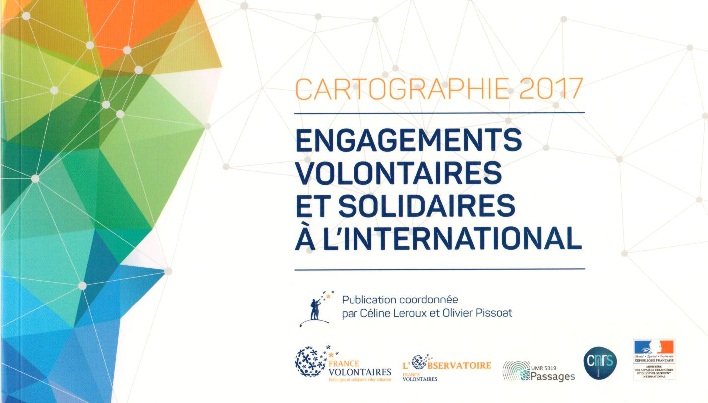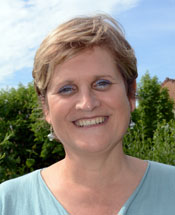All Hands on Deck Needed to Change the World | Isabelle Pypaert Perrin

By Isabelle Pypaert Perrin
France Volontaires, a French network of international volunteering exchange programs, published last March the 2017 Cartography: International Volunteering and Solidarity Work. The book’s introduction, by Isabelle Pypaert Perrin, Director General of ATD Fourth World, appears below.
 In the last few years, the news has confronted us with men, women, children, and families who have had to flee home because of conflict and natural disasters, but also because of extreme poverty. Because of these situations, some countries close their borders. Neighbourhoods and communities create closed borders too, even if these are less visible. An attitude of exclusion and discrimination becomes the norm. Efforts to achieve greater security for some throw others into increasingly vulnerable situations.
In the last few years, the news has confronted us with men, women, children, and families who have had to flee home because of conflict and natural disasters, but also because of extreme poverty. Because of these situations, some countries close their borders. Neighbourhoods and communities create closed borders too, even if these are less visible. An attitude of exclusion and discrimination becomes the norm. Efforts to achieve greater security for some throw others into increasingly vulnerable situations.
Through this publication, France Volontaires sheds some light on a different attitude and reality. We see men and women who, faced with suffering and exclusion, take action. They work for justice, foster solidarity and humanity, act as welcoming citizens, and take part in establishing a different kind of future.
Beacons of hope
Many people from diverse backgrounds decide to be involved in something they care about. Some collaborate to create associations at the local level. Others belong to international humanitarian organizations or develop networks among different countries. Still others work in migrant communities. They have a variety of goals, from responding to immediate needs to advocating for change.
This dedication to volunteer work gives us a very different outlook on our humanity and on the world. These volunteers are beacons of hope and this publication helps people recognize what they are doing. Seeing the diversity of volunteers and activities should encourage others to become involved in similar work. The book helps us all see ourselves as part of a larger community. This holistic vision can help heal the divisions that sometimes come naturally to people.
However, let’s remember that to unify humanitarian efforts requires going beyond cooperation; true collaboration needs constant work. Guillaume Nicolas asks, “How can a partnership work among NGOs [non-governmental organizations] volunteers and expatriates”? This question could also be asked about a fourth partner: the people whom the partnership is trying to help. Their lives are harsh enough without them also becoming the cause of divisions or conflicts in which they have no say. People who live in extreme poverty have taught us that unity cannot be developed only by non-profit organisers working among themselves. True partnership can exist only if the people who live in insecure conditions take part in each step of a project, starting with identifying the project’s objectives. During implementation, their sense of solidarity and their sensitivity towards the most abandoned people can serve as an important guide. Throughout evaluation, they can help resist the natural tendency to focus on the most successful people. They remind us to concentrate on those people whom a project has not yet reached.
Solutions must start with local people
Both the UN Sustainable Development Goals and the Guiding Principles on Extreme Poverty and Human Rights encourage volunteer organizations to work with people rather than doing things for them. This has become an increasingly common objective. However, partnership, particularly the poorest, is a long road. The people affected are central to the solutions, support, and solidarity that allow them to overcome problems.
If outside actors want to achieve sustainable results, they should build on people’s own efforts and work in ways that are accepted by a country’s culture. In ATD Fourth World, partnership with people living in poverty has allowed us to remain in some countries even at times of high instability. Partnership has earned us gratitude and protection. It has allowed us to adapt projects to current events and to stand strong together. This sort of partnership is explored in the article “The role volunteers play in situations of prolonged crisis”, by Agnès Golfier and Vénérand Nzigamasabo.
This publication also sheds light on a growing trend — “the world volunteering for the world”. We are thrilled about this. In the past, the spotlight often focused on volunteer commitments from Northern countries to Southern countries. However, no one has a monopoly on giving and generosity. In all countries, volunteer work takes place locally. In addition, people everywhere, especially young people, feel international needs as well. With ATD, women and men in Haiti, Tanzania, Romania, and the Philippines express their support for people in France, Great Britain, and the United States, as well as for Burkina Faso and Peru. International exchanges open people’s eyes to injustice, abandonment, and prejudice as well as possible ways of overcoming them. These experiences lead to individuals developing a new and on going awareness that will shape their future.
The accounts in Chapter 4, among others, illustrate these benefits. Teams in which there is diversity emphasize relationships of equality more than differences in competence or knowledge. This presents an opportunity for a profound renewal of a person’s commitment. In the article “Towards a volunteering world”, Alain Raymond and Edith Heurgon describe these possibilities. In the teams they describe, volunteers from all over the world live and work together. Some of the volunteers come from countries that have colonized, exploited and started wars against the countries of other volunteers. Working towards the same goal encourages people to see what they have in common and to think differently about their own history. This gives birth to a new kind of citizenship anchored by deep roots.
Education for global citizenship
The 2017 Cartography demonstrates, again and again, the importance of training. The publication focuses in Chapter 3 on the education essential to effective volunteering: an education for international citizenship and solidarity. Living in a new country with a foreign culture, encountering situations of great distress, and working in partnership with diverse people all require preparation and training. Each person needs to know how to learn from past experiences to gain perspective. “Exchanging best practices among volunteers is essential to strengthen the quality of projects” by Joris Thomann highlights how associations have an opportunity to move forward in this area. This sort of training that occurs over a lifetime. It is a way of life that becomes a lifestyle.
Obstacles to travel, especially obtaining a visa, remain numerous. Volunteers from Latin America, the Caribbean, Africa, and Asia have more difficulty getting visas to move around the world. However, obtaining a visa is not the only obstacle. The volunteer opportunities open to a young person from a disadvantaged environment in any country are very minimal. These young people are less well informed and often must help support their families.
In 1985, when young people from around the world gathered at the ILO for the International Year of Youth, Joseph Wresinski told them,
“All hands are useful for changing the world”.
His statement is an invitation for every organization to take seriously the volunteering ambitions of young people from all backgrounds, environments, and countries, and to find the means to fulfil them. It calls to mind the UN Secretary-General’s report “One Humanity, Shared Responsibility” and the Humanitarian Summit of Istanbul which followed. We are making progress; let us continue to work together.
Photo: Front page of the Cartography 2017 of International Volunteer and Solidarity Commitments

